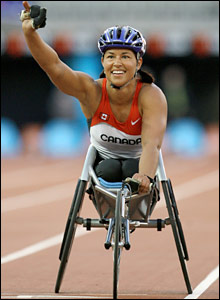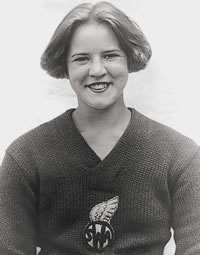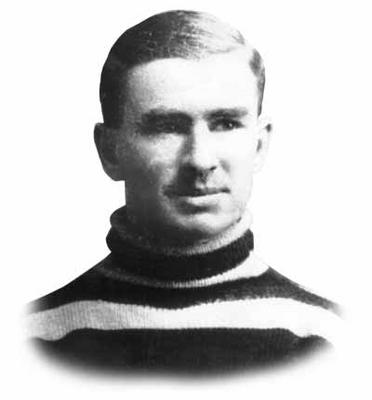We will have come of age when the media criticise our performances and are negative about us in the same way as they are for other sportspeople rather than constantly praising us as being ‘brave’. Paralympians are achievers who do not necessarily wish to be portrayed constantly as ‘overcoming adversity’.”
--Dame Tanni Grey-Thompson
This quote (and one of Dame Tanni's racing chairs) is part of an exhibit at the National Library of Wales, "Following the Flame" (Dilyn y Fflam), which opened over the weekend. The exhibit is about Olympic history, in anticipation of the 2012 London Games, and has several focuses or themes, including Welsh athletes, and paralympians. Simon Richardson was the guest at the opening. There are photos at the NLW's Facebook page; looks worth a visit.
Showing posts with label athlete. Show all posts
Showing posts with label athlete. Show all posts
Tuesday, April 03, 2012
Wednesday, October 14, 2009
October 14: Katarzyna Rogowiec (b. 1977)

Just trolling around today's birthdays on Wikipedia, spotted Paralympian Katarzyna Rogowiec. She was born on this date in 1977, in Rabka-Zdrój, Poland. At age 3, she lost both hands in an accident with farming equipment (she doesn't remember the event). She's an economist by education and occupation. Rogowiec won two gold medals at the 2006 Turin Paralympics, as a cross-country skiier, and she's the current world champion paralympian in the biathlon event as well. Just last week she finished second in the women's cross-country skiing 15km event at the Paralympic Winter World Cup held in Solleftea, Sweden.
Thursday, March 06, 2008
March 6: Pete Gray (1915-2002)

[Image description: a black-and-white publicity photo of a one-armed baseball player in a St. Louis uniform, autographed "Pete Gray"; he's tossing a ball in the air, while nearby his glove is midair]Ask most baseball fans today to name a one-handed player in the Major Leagues, and they're likely to say Jim Abbott--and that's a good answer. But ask someone older, from northeastern Pennsylvania, and you're as likely to hear the answer "Pete Gray." Pete Gray was born Peter Wyshner in Nanticoke PA, this date in 1915, the son of immigrants from Lithuania; his right arm was amputated at age 6, after a wagon accident. Wyshner lived in coal-mining country, so there were plenty of others with accidental injuries and lost limbs in his community--and it wasn't considered too unusual that he'd still want to play baseball. When he wasn't working as a water boy at the Truesdale Colliery, of course.
He played in the minor leagues during the WWII, when so many of the usual players were in uniform; then in 1945, he was picked up by the St. Louis Browns, and played 77 games in the majors as an outfielder. He was famous for the speed with which he could catch a ball in his glove, toss the ball in the air, remove the glove, grasp the ball, and throw it (that's the maneuver depicted in the publicity still above). As Pete Gray, he was featured in newsreels, a novelty story intended to inspire returning troops and attract audiences to the games. He stayed in baseball's minor leagues into the early 1950s, then retired to Nanticoke. His later years were hard; he died in a nursing home in 2002, after years of alcoholism and very little income. Pete Gray's glove is in the Hall of Fame at Cooperstown.
Print sources for further reading:
William C. Kashatus, One-Armed Wonder: Pete Gray, Wartime Baseball, and the American Dream (McFarland & Co. 1995).
William C. Kashatus, "Baseball's One-Armed Wonder: An Interview with the Late Great, Pete Gray," Pennsylvania Heritage (Spring 2003): 30-37.
Labels:
amputee,
athlete,
birthday,
disability history,
sports
Sunday, August 26, 2007
August 26: Rick Hansen (b. 1957)
 Canadian Paralympian Rick Hansen (pictured at left, on his "Man in Motion" world tour) is turning 50 today--he was born on this date in 1957, in Port Alberni, British Columbia. He was an athletic kid who excelled in several sports. When he was fifteen, he was paralyzed from the waist down in a car accident. So he turned to wheelchair sports, and was more competitive than ever: he became a national champion player in wheelchair volleyball and wheelchair basketball, and a world-class wheelchair marathoner. Hansen won a gold medal at the 1980 Summer Paralympics.
Canadian Paralympian Rick Hansen (pictured at left, on his "Man in Motion" world tour) is turning 50 today--he was born on this date in 1957, in Port Alberni, British Columbia. He was an athletic kid who excelled in several sports. When he was fifteen, he was paralyzed from the waist down in a car accident. So he turned to wheelchair sports, and was more competitive than ever: he became a national champion player in wheelchair volleyball and wheelchair basketball, and a world-class wheelchair marathoner. Hansen won a gold medal at the 1980 Summer Paralympics.Hansen's 1985-87 "Man in Motion" tour took him wheeling through more than thirty countries, over 26 months, 40K kilometers, to raise money for spinal cord research and other causes. The wheelchair he used on that tour is now in the museum of the BC Sports Hall of Fame. There are video and audio clips of the news coverage of Hansen's world tour here.
Hansen is now president and CEO of the Rick Hansen Foundation, which raises money for research and support programs related to spinal cord injuries. He's married, and the father of three daughters. There are three Canadian public schools named for Hansen, and one township in Ontario--right next to Roosevelt Township, it is (it was named Stalin until 1986, so I'd guess they were going to change it anyway?).
Bit of 80s trivia: you know the title song for the 1985 film "St. Elmo's Fire"? It's about Rick Hansen. Lyrics include: "Gonna be your man in motion/All I need is a pair of wheels." (See, that never made sense for the movie, but it makes sense now, doesn't it? Mystery solved.)
Labels:
aralympics,
athlete,
birthday,
Canada,
Paralympics,
sports
Friday, December 15, 2006
December 15: Chantal Petitclerc (b. 1969)
 A world class performance is a world class performance - on a bike, in the pool or in a wheelchair.
A world class performance is a world class performance - on a bike, in the pool or in a wheelchair.--Chantal Petitclerc
Today is the 37th birthday of Canadian athlete Chantal Petitclerc, born on this date in 1969 in Saint-Marc-des-Carrières, Quebec. She had a spinal cord injury in an accident when she was 13. In high school, a coach encouraged her to swim for upper-body strength and overall stamina; at 18, she discovered wheelchair racing, and it turned out that she would become very, very good at that sport: she holds sixteen medals from four Paralympic Games (Barcelona 1992, Atlanta 1996, Sydney 2000, and Athens 2004)--including five gold medals at the 2004 Games. She's also been on the Canadian team for the Commonwealth Games in 2002 and 2006, and the Canadian record holder in five events. And she's been the spokeswoman for Defi Sportif, a Canadian organization for athletes with disabilities.
Petitclerc caused a bit of scandal in 2004, when she turned down a trophy from Athletics Canada--it's awarded each year to the track-and-field athlete of the year. Petitclerc was to be co-winner with Perdita Felicien, a hurdler who had a disappointing performance in the Athens Olympics that year. Petitclerc considered the co-winner status to be patronizing. "To me, it's really a symptom that they can't evaluate the value of a Paralympic medal - that it's easier to win a Paralympic medal than an Olympic medal," she explained. "That may have been true 15 years ago. That's not the case any more."
In 2005 Petitclerc was named Canada's female athlete of the year, as well as the Laureus Award, given by sports journalists around the world to the disabled athlete of the year. That same year, she was inducted into the Terry Fox Hall of Fame.
Labels:
athlete,
birthday,
Canada,
Paralympics,
sports
Monday, November 13, 2006
November 14: Silken Laumann (b. 1964)
 Before '92 I was a strong person, but I wondered how strong I would be if something bad happened. Then something bad did happen and I didn't wallow in sorrow. I just figured, O.K., what do I do now?
Before '92 I was a strong person, but I wondered how strong I would be if something bad happened. Then something bad did happen and I didn't wallow in sorrow. I just figured, O.K., what do I do now? Canadian rowing champion Silken Laumann (left) was born on this date in 1964, in Mississauga, Ontario, the daughter of recent immigrants from Germany. She earned a bronze medal at the 1984 Olympics, and was on the Canadian rowing team for the 1988 Olympics. While training for the 1992 Games, her right leg was badly injured in a collision between two boats. After winning the bronze in Barcelona anyway (two months later), she took off a year for further surgeries and rehabilitation, then returned to win a silver medal in the 1996 Olympics. She's now retired from competition, and does motivational speaking, and advocacy for inclusive and creative children's play and fitness programs, in Canada and abroad (through Right to Play).
Monday, October 23, 2006
October 23: Gertrude Ederle (1905-2003)

Also born on October 23 (either 1905 or 1906, sources disagree--if the latter, this is her centennial), American swimmer Gertrude Ederle. She began breaking amateur records at the age of 12; by 18, she had won three Olympic medals, and was preparing to cross the English Channel. In 1926, on her second attempt, she made the crossing, hours faster than any man had ever done. She was the first woman to swim the Channel, and was greeted with a tickertape parade on her return to the US.
Why is this a disability history story? Because Ederle was deaf, beginning with the effects of severe measles in childhood. After WWII, Ederle taught swimming for years, to the students at the Lexington School for the Deaf in New York City.
Tuesday, September 27, 2005
Disability History Image #4: "One-Eyed Frank" McGee

When I was a kid, I read the dictionary for fun (sad maybe, but true). Now, I get some of the same kick from biographical dictionaries. I've been trolling through the very searchable Dictionary of Canadian Biography Online for disability history stories to add to the Disability History Dateline. Mostly, you'll find asylum administrators, 19c. figures in deaf education, and nuns who started homes for "the aged and infirm." But every once in a while, there's someone more offbeat.
"One-Eyed" Frank McGee (b. 1882) was a hockey player, and a good one--he led the Ottawa Silver Seven to three consecutive Stanley Cup championships, 1903, 1904, and 1905. In one 1905 game, he scored a fourteen goals, a record that still stands. Then he retired, in 1907. McGee had lost an eye as a teenager (in a hockey accident), and was thinking maybe he'd get out of the violent sport that could put the remaining eye at risk. But that cautious approach seems to have been short-lived, because in 1915 he enlisted in the Canadian Army to fight in World War I. Family legend says he tricked the examiner to get a passing vision test; but a look at the form itself shows the examiner left the crucial space blank--so maybe he noticed McGee's partial blindness and just decided not to record it. Anyway, McGee was injured in battle, and unfit for duty for seven months, but he insisted on returning to combat duty after recovering. He was killed in France in September 1916, during the Somme offensive. In 1945, he was in the first class of inductees to the Hockey Hall of Fame.
Labels:
athlete,
Canada,
disability history,
sports,
war
Subscribe to:
Posts (Atom)